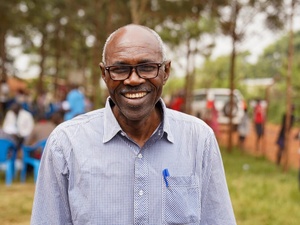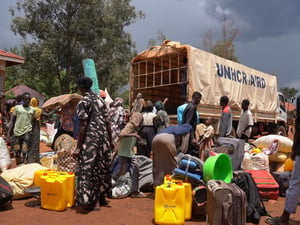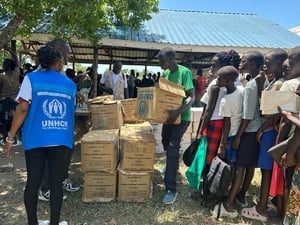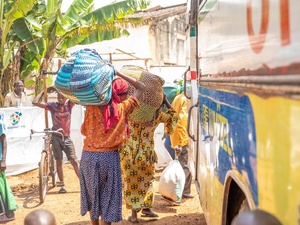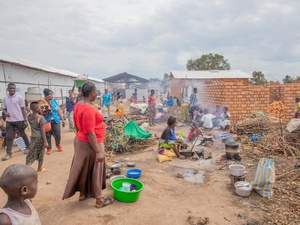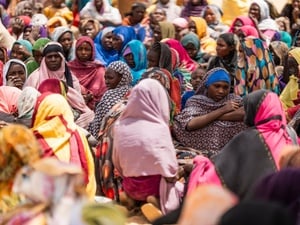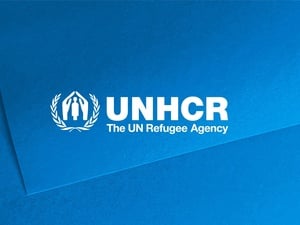Feature: Uganda's refugees stand tall with new sports equipment
Feature: Uganda's refugees stand tall with new sports equipment

Refugees at Navikale settlement peforming at the sports and games festival.
NAKIVALE, Uganda (UNHCR) - More than 250 refugee children in Uganda's Nakivale refugee settlement broke into song and dance when German Ambassador Klaus Holderbaum drove into the dusty camp of 13,000. He brought with him an eagerly anticipated donation of footballs, skipping ropes, hoops, ball pumps, and above all, a message that the German government cares about refugees.
Contributing the sports equipment in late January, the German envoy to Uganda, who was also the chief guest at Nakivale's sports and games festival, told hundreds of refugees gathered around a newly-built playground that sports is an important means of bringing people of different nationalities together.
"That sports is able to build bridges between children, women and men from different cultures is demonstrated in a very nice way by you, the people of Nakivale," said Ambassador Holderbaum. "I am very proud to hand over the donation of the German Foreign Office and the National Olympic Committee for Germany. I want to emphasise that the German government cares about you, the refugees."
Shortly after, he inaugurated the playground built specially for pre-school refugee children in Juru A kindergarten, one of 15 schools that cater to some 900 pre-school children in Nakivale.
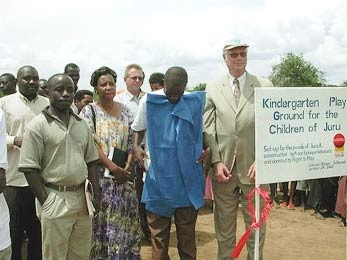
German Ambassador Klaus Holderbaum (right) inaugurating a playground at Navikale's Jura A kindergarten.
Nakivale refugee settlement, in southern Uganda, is home to 13,000 refugees from Rwanda, Burundi, the Democratic Republic of the Congo, Sudan and Somalia. Many of them have lived in exile in Uganda for decades, waiting for peace to return to their homelands.
But as they wait, they are working with the sports development group, Right to Play, formerly known as Olympic Aid, to develop sports in the camp. The aim is to use sports and play as a means of promoting education, health, conflict resolution and child development.
The organisation, which works with refugees in eight other countries in Africa, began its work in Nakivale refugee settlement in November 2001. So far, it has trained 33 sports coaches, with 46 more still in training in programmes that are offered both in English and French to cater to the language diversity in Nakivale.
Right to Play also organises regular play days - days set aside specifically for outdoor activities and games for refugee children. These include games from the refugees' own cultures and communities. Play days in Nakivale can attract up to 1,000 children.
Speaking at the sports and games festival organised by Right to Play, Heiko Ripper, the organisation's project co-ordinator in Nakivale, thanked Ambassador Holderbaum for the sports donation, adding that the equipment would open up more sporting opportunities for the refugees.
"I can assure you that the sports equipment will reach many, many children, children who really need it," Ripper told the German diplomat. "It enables us to offer more sport and play activities with much more fun and entertainment for the boys and girls of Nakivale."
The presence of a foreign dignitary from the capital, Kampala, presented a good opportunity for entertainment - not just for the visitor but also for the camp community.
They watched acrobats, some on stilts, as they danced to the thunderous drumbeats of Burundian drummers. The crowd expressed its admiration for the graceful movements of young Rwandan refugee girls who performed imishayayo, a common Rwandan dance in which dancers imitate the movement of the horns of long - horned cows. They also cheered the winning team in games organised at the new playground.
When it was time for Ambassador Holderbaum to leave for Kampala, 45 refugee sports coaches prepared a "guard of honour". They lined both sides of the path to his car and bade him farewell, grateful for the donation that will help liven up their long days away from home.
By Milicent Mutuli, Bushra Malik
UNHCR Uganda


